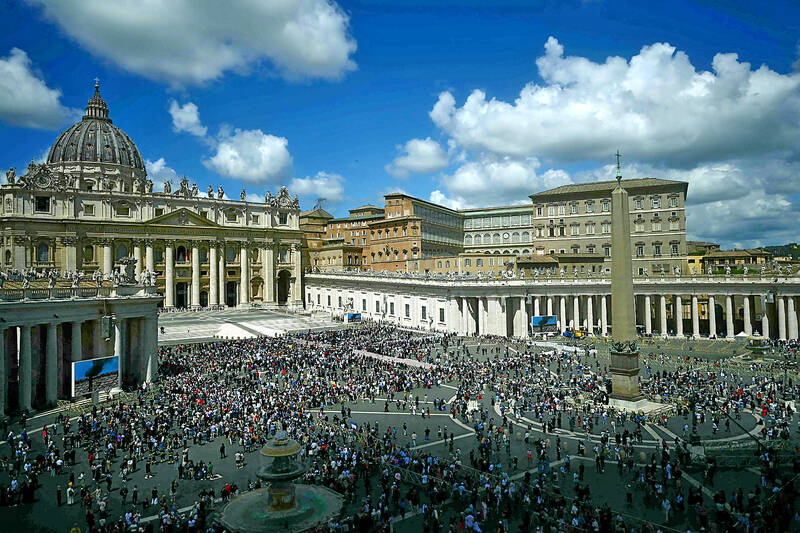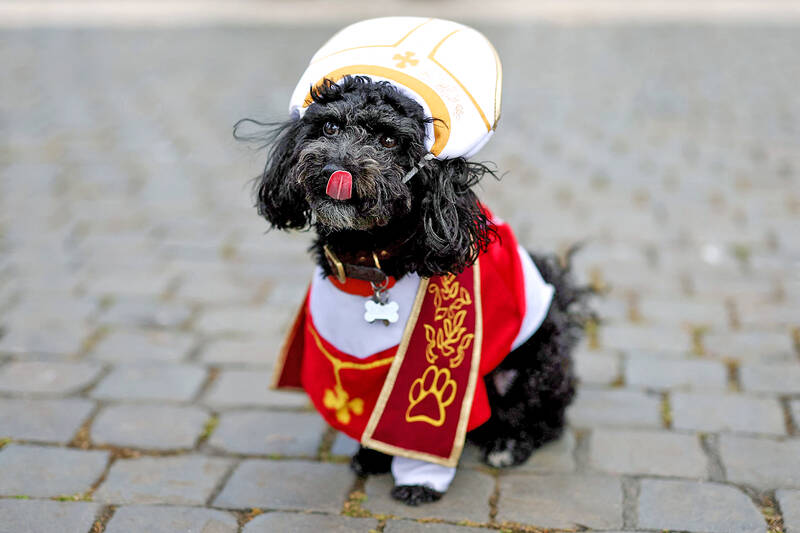Thick black smoke yesterday billowed from the chimney of the Sistine Chapel in a sign that cardinals again failed to elect a new head of the Catholic Church, but they were scheduled to hold two more rounds of voting after press time last night.
Among the thousands of Catholics and curious tourists massed in St Peter’s Square, there was applause, but also sighs at the result, which came after the second and third ballots.
The 133 cardinals voting for a successor to Pope Francis as head of the world’s 1.4 billion Catholics were shut in for the secretive conclave on Wednesday evening.

Photo: AFP
Sequestered away from the world, they communicate their progress by burning their ballot papers and sending up smoke through the chimney of the frescoed 15th-century chapel.
Black smoke means no one has secured the minimum two-thirds majority — 89 votes — and white smoke signals the election of the 267th pope.
The first black smoke on Wednesday evening arrived three hours and 15 minutes after the cardinals closed their doors, greeted with some disappointment by the assembled crowds.

Photo: Reuters
Many people returned yesterday, where the red-robed prelates held two more ballots in the morning. They were scheduled to hold another two in the afternoon, after press time last night, and then four more today, unless a pope is elected sooner.
“I don’t want it rushed — whatever they need to do to make the right decision,” said Barbara Mason, 50, who traveled from Canada for the conclave.
She was hoping for a pope who would continue in Francis’ progressive footsteps, especially as a champion of the environment and migrants, “going forward, not going backward.”
Francis, a charismatic Argentine reformer who sought to open up the Church during his 12 years as pope, died on April 21 aged 88.
Paolo Cabrera, 40, from the Philippines, arrived early at the Vatican with his wife, Cynthia Cabrera, to secure a spot as close as possible to St Peter’s Basilica, where the new pontiff would be presented to the world from the balcony after the vote.
“It is very, very exciting to be here,” he said.
As Filipinos, they said they were rooting for their compatriot Cardinal Luis Antonio Tagle, one of the favorites — but said that they would be happy with “anybody appointed by God.”
Seated at tables and chairs laid out beneath Michelangelo’s frescoes in the Sistine Chapel, each cardinal elector must write down their choice for pope on a ballot paper and take it to the altar, where it is put in a silver urn.
After the ballots have been counted, they are burned in a cast iron stove dating back to 1939. Chemicals are added to a second, newer stove, connected to the same flue, which color the smoke.

NATIONAL SECURITY THREAT: An official said that Guan Guan’s comments had gone beyond the threshold of free speech, as she advocated for the destruction of the ROC China-born media influencer Guan Guan’s (關關) residency permit has been revoked for repeatedly posting pro-China content that threatens national security, the National Immigration Agency said yesterday. Guan Guan has said many controversial things in her videos posted to Douyin (抖音), including “the red flag will soon be painted all over Taiwan” and “Taiwan is an inseparable part of China,” while expressing hope for expedited “reunification.” The agency received multiple reports alleging that Guan Guan had advocated for armed reunification last year. After investigating, the agency last month issued a notice requiring her to appear and account for her actions. Guan Guan appeared as required,

DAREDEVIL: Honnold said it had always been a dream of his to climb Taipei 101, while a Netflix producer said the skyscraper was ‘a real icon of this country’ US climber Alex Honnold yesterday took on Taiwan’s tallest building, becoming the first person to scale Taipei 101 without a rope, harness or safety net. Hundreds of spectators gathered at the base of the 101-story skyscraper to watch Honnold, 40, embark on his daredevil feat, which was also broadcast live on Netflix. Dressed in a red T-shirt and yellow custom-made climbing shoes, Honnold swiftly moved up the southeast face of the glass and steel building. At one point, he stepped onto a platform midway up to wave down at fans and onlookers who were taking photos. People watching from inside

A Vietnamese migrant worker yesterday won NT$12 million (US$379,627) on a Lunar New Year scratch card in Kaohsiung as part of Taiwan Lottery Co’s (台灣彩券) “NT$12 Million Grand Fortune” (1200萬大吉利) game. The man was the first top-prize winner of the new game launched on Jan. 6 to mark the Lunar New Year. Three Vietnamese migrant workers visited a Taiwan Lottery shop on Xinyue Street in Kaohsiung’s Gangshan District (崗山), a store representative said. The player bought multiple tickets and, after winning nothing, held the final lottery ticket in one hand and rubbed the store’s statue of the Maitreya Buddha’s belly with the other,

‘NATO-PLUS’: ‘Our strategic partners in the Indo-Pacific are facing increasing aggression by the Chinese Communist Party,’ US Representative Rob Wittman said The US House of Representatives on Monday released its version of the Consolidated Appropriations Act, which includes US$1.15 billion to support security cooperation with Taiwan. The omnibus act, covering US$1.2 trillion of spending, allocates US$1 billion for the Taiwan Security Cooperation Initiative, as well as US$150 million for the replacement of defense articles and reimbursement of defense services provided to Taiwan. The fund allocations were based on the US National Defense Authorization Act for fiscal 2026 that was passed by the US Congress last month and authorized up to US$1 billion to the US Defense Security Cooperation Agency in support of the